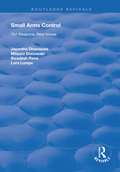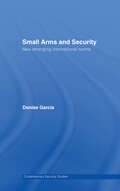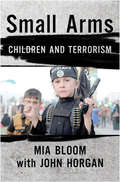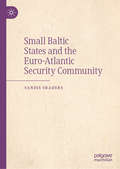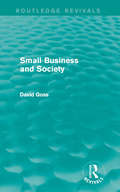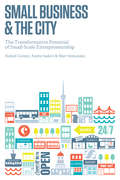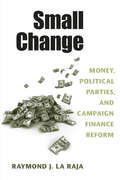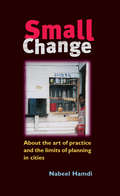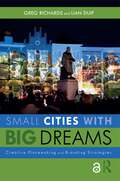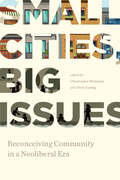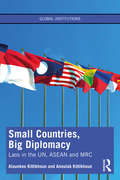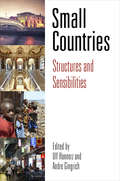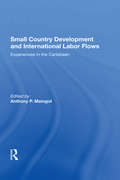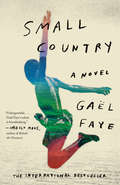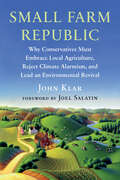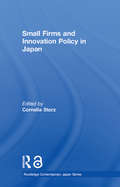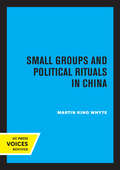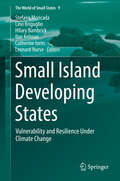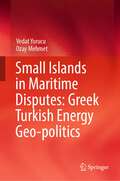- Table View
- List View
Small Arms Control: Old Weapons, New Issues (Routledge Revivals)
by Jayantha Dhanapala Mitsuro Donowaki Lora LumpeFirst published in 1999, the papers collected in this volume were originally prepared for four workshops organized by the UN Department for Disarmament Affairs to inform the work of the Panel of Governmental Experts on Small Arms. These workshops were held during 1995-96. Some of the authors updated their papers for publication in early 1998. Lora Lumpe, senior fellow with the Norwegian Initiative on Small Arms Transfers in Oslo and Tamar Gabelnick, Acting Director of the Arms Sales Monitoring Project at the Federation of American Scientists in Washington, DC edited the presentations for this book.
Small Arms Survey 2003: Development Denied
by Small Arms SurveyThe Small Arms Survey is now recognized as the principle international source of impartial and reliable information on all aspects of small arms. Its blend of information and analysis makes it an indispensable resource for policy-makers, officials and non-governmental organizations.
Small Arms Survey 2012
by Small Arms Survey GenevaThe Small Arms Survey 2012 seeks to increase our scrutiny of what is changing, and not changing, in relation to armed violence and small arms proliferation. Chapters on firearm homicide in Latin America and the Caribbean, drug violence in selected Latin American countries and non-lethal violence worldwide illustrate that security is a moving target; armed violence, both lethal and non-lethal, continues to undermine the security and wellbeing of people and societies around the world. The goal of curbing small arms proliferation, embodied in the UN Programme of Action, appears similarly elusive. Chapters on illicit small arms in war zones, trade transparency, Somali piracy and the 2011 UN Meeting of Governmental Experts highlight some of the successes, but also the continuing challenges, in this area. Country studies on Kazakhstan and Somaliland, along with the final instalment of the authorized transfers project, round out the 2012 edition.
Small Arms Survey 2014
by Small Arms SurveyThe Small Arms Survey 2014 considers the multiple roles of women in the context of armed violence, security, and the small arms agenda. The volume's thematic section comprises one chapter on violence against women and girls - with a focus on post-conflict Liberia and Nepal - and another on the recent convergence of the small arms agenda with that of women, peace and security. Complementing these chapters are illustrated testimonies of women with experience as soldiers, rebels and security personnel. The 'weapons and markets' section assesses the potential impact of the Arms Trade Treaty, presents the 2014 Transparency Barometer and an update on the authorized small arms trade, and analyses recent ammunition explosions in the Republic of the Congo. Additionally, it examines ammunition circulating in Africa and the Middle East, maps the sources of insurgent weapons in Sudan and South Sudan, and evaluates crime gun records in the United States.
Small Arms and Security: New Emerging International Norms (Contemporary Security Studies)
by Denise GarciaThis book examines the emergence of new international norms to govern the spread of small arms, and the extent to which these norms have been established in the policies and practices of states, regions and international organizations. It also attempts to establish criteria for assessing norm emergence, and to assess the process of norm development by comparing what actually happens at the multilateral level. If norm-making on small arms and related multilateral negotiations have mostly dealt with ‘illicit arms’, and most of the norms examined here fall on the arms supplier side of the arms equation, the author argues that the creation of international norms and the setting of widely agreed standards amongst states on all aspects of the demand for, availability, and spread of both legal and illegal small arms and light weapons must become central to the multilateral coordination of policy responses in order to tackle the growing violence associated with small arms availability. Small Arms and Security will be of interest to researchers and professionals in the fields of peace and conflict studies, global governance, international security and disarmament.
Small Arms, Crime and Conflict: Global Governance and the Threat of Armed Violence (Routledge Studies in Peace and Conflict Resolution)
by Nicholas Marsh Owen GreeneThis book focuses on the use of small arms in violence and attempts by the state to govern the use and acquisition of these weapons. It is likely that hundreds of thousands of people are killed every year as a result of armed violence – in contexts ranging from war zones to domestic violence. This edited volume examines why these deaths occur, the role of guns and other weapons, and how governance can be used to reduce and prevent those deaths. Drawing on a variety of disciplines, ranging from anthropology through economics to peace and security studies, the book’s main concern throughout is that of human security – the causes and means of prevention of armed violence. The first part of the book concerns warfare, the second armed violence and crime, and the last governance of arms and their (mis)-use. The concluding chapter builds on the contributors’ key findings and suggests priorities for future research, with the aim of forming a coherent narrative which examines what we know, why armed violence occurs, and what can be done to reduce it. This book will be of much interest to students of small arms, security studies, global governance, peace and conflict studies, and IR.
Small Arms: Children and Terrorism
by Mia BloomWhy do terrorist organizations use children to support their cause and carry out their activities? Small Arms uncovers the brutal truth behind the mobilization of children by terrorist groups. Mia Bloom and John Horgan show us the grim underbelly of society that allows and even encourages the use of children to conduct terrorist activities. They provide readers with the who, what, when, why, and how of this increasingly concerning situation, illuminating a phenomenon that to most of us seems abhorrent. And yet, they argue, for terrorist groups the use of children carries many benefits. Children possess skills that adults lack. They often bring innovation and creativity. Children are, in fact, a superb demographic from which to recruit if you are a terrorist.Small Arms answers questions about recruitment strategies and tactics, determines what makes a child terrorist and what makes him or her different from an adult one, and charts the ways in which organizations use them. The unconventional focus on child and youth militants allows the authors to, in essence, give us a biography of the child terrorist and the organizations that use them. We are taken inside the mind of the adult and the child to witness that which perhaps most scares us.
Small Baltic States and the Euro-Atlantic Security Community
by Sandis SradersThis book analyzes the small Baltic States and their integration into the Euro-Atlantic structures from the perspective of the foreign policies of major powers - the United States, Russia, and major European powers and institutions - towards the region, or each of the Baltic States. While focusing primarily on the Post-Cold war period, it will also cover years of Baltic occupation, areas and matters related to their motivation and means to join the EU and NATO. Smallness, weaknesses and sensitivities as well as historic experiences of three Baltic States made the task to integrate with the Euro-Atlantic community urgent. This will be a valuable source of information for all interested in the Baltic States, foreign policies of major powers shaping events in the region, the surge of the Euro-Atlantic community and the Post-Cold War enlargement allowing small Baltic States to remedy their inherent security weaknesses.
Small Business and Society (Routledge Revivals)
by David GossWhen this book was first published in 1991, political ideology had thrust small-firm issues to the forefront of attempts to revitalize the British economy. In the Thatcher years the emphasis had been on individual enterprise and initiative with the number of small firms increasing rapidly. This was reflected in the growth in the number of specialist studies analysis small-firm revivalism. Small Business and Society clarifies the issues and debates that surround the small business and its place in society. In particular, the complex nature of its social role is examined: on the one hand, the entrepreneur can be seen as the innovator exploiting free-market capitalism to strengthen the economy; on the other, employment conditions and industrial relations are said to suffer. Moreover, the growing importance of ‘green’ issues now brings into question the extent to which the small firm benefits the environment. This book will be of interest to students of business and sociology.
Small Business and the City
by Rafael Gomez Andre Isakov Matthew SemanskyIn Small Business and the City, Rafael Gomez, Andre Isakov, and Matt Semansky highlight the power of small-scale entrepreneurship to transform local neighbourhoods and the cities they inhabit. Studying the factors which enable small businesses to survive and thrive, they highlight the success of a Canadian concept which has spread worldwide: the Business Improvement Area (BIA). BIAs allow small-scale entrepreneurs to pool their resources with like-minded businesses, becoming sources of urban rejuvenation, magnets for human talent, and incubators for local innovation in cities around the globe.Small Business and the City also analyses the policies necessary to support this urban vitality, describing how cities can encourage and support locally owned independent businesses. An inspiring account of the dynamism of urban life, Small Business and the City introduces a new "main street agenda" for the twenty-first century city.
Small Change
by Raymond J. La RajaSmall Change offers an engaging account of campaign finance reforms' contradictory history; it is a must-read for anyone concerned about influence of money on democratic elections. La Raja traces the history of the U. S. campaign finance system from the late nineteenth century through the passage of the Bipartisan Campaign Reform Act (BCRA) of 2002. Then, using the 2004 presidential election as a case study, he compares the ways in which Democrats and Republicans adapted their national fund-raising and campaigning strategies to satisfy BCRA regulations. Drawing upon this wealth of historical and recent evidence, he concludes with recommendations for reforming campaign finance in ways that promote fair competition among candidates and guarantee their accountability to voters. Book jacket.
Small Change: About the Art of Practice and the Limits of Planning in Cities
by Nabeel HamdiWhat exactly is 'small change'? Build a bus stop in an urban slum and a vibrant community sprouts and grows around it - that is the power of small changes that have huge positive effects. This book is an argument for the wisdom of the street, the ingenuity of the improvisers and the long-term, large-scale effectiveness of immediate, small-scale actions. Written by Nabeel Hamdi, the guru of urban participatory development and the master of the art, Small Change brings over three decades of experience and knowledge to bear on the question 'what is practice'?. Through an easy-to-read narrative style, and using examples from the North and South, the author sheds light on this question and the issues that stem from it - issues relating to political context, the lessons of the 'informal city', and the pursuit of learning that challenges convention. The result is a comprehensive, yet imaginative, guide to the forms of knowledge, competencies and ways of thinking that are fundamental to skilful practice in urban development. This is powerful, informed, critical and inspiring reading for practitioners in the field, students and teachers of urban development, those who manage international aid and everyone looking to build their community.
Small Cities with Big Dreams: Creative Placemaking and Branding Strategies
by Greg Richards Lian DuifHow can small cities make an impact in a globalizing world dominated by ‘world cities’ and urban development strategies aimed at increasing agglomeration? This book addresses the challenges of smaller cities trying to put themselves on the map, attract resources and initiate development. Placemaking has become an important tool for driving urban development that is sensitive to the needs of communities. This volume examines the development of creative placemaking practices that can help to link small cities to external networks, stimulate collaboration and help them make the most of the opportunities presented by the knowledge economy. The authors argue that the adoption of more strategic, holistic placemaking strategies that engage all stakeholders can be a successful alternative to copying bigger places. Drawing on a range of examples from around the world, they analyse small city development strategies and identify key success factors. This book focuses on the case of ‘s-Hertogenbosch, a small Dutch city that used cultural programming to link itself to global networks and stimulate economic, cultural, social and creative development. It advocates the use of cultural programming strategies as a more flexible alternative to traditional top-down planning approaches and as a means of avoiding copying the big city. The Open Access version of this book, available at http://www.taylorfrancis.com, has been made available under a Creative Commons Attribution-Non Commercial-No Derivatives (CC-BY-NC-ND) 4.0 license.
Small Cities, Big Issues: Reconceiving Community in a Neoliberal Era
by Christopher Walmsley Terry KadingSmall Canadian cities confront serious social issues as a result of the neoliberal economic restructuring practiced by both federal and provincial governments since the 1980s. Drastic spending reductions and ongoing restraint in social assistance, income supports, and the provision of affordable housing, combined with the offloading of social responsibilities onto municipalities, has contributed to the generalization of social issues once chiefly associated with Canada’s largest urban centres. As the investigations in this volume illustrate, while some communities responded to these issues with inclusionary and progressive actions others were more exclusionary and reactive—revealing forms of discrimination, exclusion, and “othering” in the implementation of practices and policies. Importantly, however their investigations reveal a broad range of responses to the social issues they face. No matter the process and results of the proposed solutions, what the contributors uncovered were distinctive attributes of the small city as it struggles to confront increasingly complex social issues. If local governments accept a social agenda as part of its responsibilities, the contributors to Small Cities, Big Issues believe that small cities can succeed in reconceiving community based on the ideals of acceptance, accommodation, and inclusion.
Small Cities: Urban Experience Beyond the Metropolis (Questioning Cities)
by David Bell Mark JayneUntil now, much research in the field of urban planning and change has focused on the economic, political, social, cultural and spatial transformations of global cities and larger metropolitan areas. In this topical new volume, David Bell and Mark Jayne redress this balance, focusing on urban change within small cities around the world. Drawing together research from a strong international team of contributors, this four part book is the first systematic overview of small cities. A comprehensive and integrated primer with coverage of all key topics, it takes a multi-disciplinary approach to an important contemporary urban phenomenon. The book addresses: political and economic decision making urban economic development and competitive advantage cultural infrastructure and planning in the regeneration of small cities identities, lifestyles and ways in which different groups interact in small cities. Centering on urban change as opposed to pure ethnographic description, the book’s focus on informed empirical research raises many important issues. Its blend of conceptual chapters and theoretically directed case studies provides an excellent resource for a broad spectrum of undergraduate and postgraduate students, as well as providing a rich resource for academics and researchers.
Small Countries, Big Diplomacy: Laos in the UN, ASEAN and MRC (Global Institutions)
by Anoulak Kittikhoun Alounkeo KittikhounThis book shows how small countries use "big" diplomacy to advance national interests and global agendas – from issues of peace and security (the South China Sea and nuclearization in Korea) and human rights (decolonization) to development (landlocked and least developed countries) and environment (hydropower development). Using the case of Laos, it explores how a small landlocked developing state maneuvered among the big players and championed causes of international concern at three of the world’s important global institutions – the United Nations (UN), the Association of Southeast Asian Nations (ASEAN) and the Mekong River Commission (MRC). Recounting the geographical and historical origins behind Laos’ diplomacy, this book traces the journey of the country, surrounded by its five larger neighbors China, Thailand, Vietnam, Myanmar and Cambodia, and influenced by superpower rivalries, from the Cold War to the post-Cold War eras. The book is written from an integrated perspective of a French-educated Lao diplomat with over 40 years of experience in various senior roles in the Lao government, leading major groups and committees at the UN and ASEAN; and the theoretical knowledge and experience of an American-trained Lao political scientist and international civil servant who has worked for the Lao government and the international secretariats of the UN and MRC. These different perspectives bridge not only the theory-practice divide but also the government insider-outsider schism. The book concludes with "seven rules for small state diplomacy" that should prove useful for diplomats, statespersons, policymakers and international civil servants alike. It will also be of interest to scholars and experts in the fields of international relations and foreign policies of Laos, the Mekong and Asia in general.
Small Countries: Structures and Sensibilities
by Ulf Hannerz Andre GingrichWhat is a small country? Is a country small because of the size of its territory or its population? Can smallness be relative, based on the subjective perception of a country's inhabitants or in comparison with one's neighbors? How does smallness, however it is defined, shape a country and its relations with other countries? Answers to these questions, among others, can be found in Small Countries, the first and only anthropological study of smallness as a defining variable.In terms of population size, some two thirds of the countries of the world can now be considered small countries, and they can be found in all world regions except North America and East Asia. They exhibit great diversity with regard to culture, history, and institutional arrangements, so there can be no model of any "typical" small country. Yet the essays collected by Ulf Hannerz and Andre Gingrich identify a range of family resemblances in such areas as internal connectivity and sensibilities of identity. Contributors describe a number of similar problems with which small countries must cope, on domestic levels as well as in their transnational and global encounters. For some small countries, challenges such as media organization and branding have a negative impact on real or perceived vulnerability, while for others, the same challenges facilitate success stories.Comparative case studies cover a diverse set of regions, including the Caribbean, Middle East, Africa, and Europe, and employ diverse anthropological approaches. Tacit assumptions about scale, identities, and networks in everyday social life are best revealed through close, interpretive effort. At times a sense of shared belonging comes to the fore with particular events, such as a national crisis or an unexpected success in international sports, offering scope for situational analyses. In showing how small countries confront globalization, Small Countries reveals how the sense of scale intensifies when the world as a whole shrinks.Contributors: Regina F. Bendix, Aleksandar Bošković, Virginia R. Dominguez, Thomas Hylland Eriksen, Andre Gingrich, Beng-Lan Goh, Ulf Hannerz, Sulayman N. Khalaf, Eva-Maria Knoll, Jacqueline Knörr, Orvar Löfgren, João de Pina-Cabral, Don Robotham, Cris Shore, Richard Wilk, Helena Wulff.
Small Country Development And International Labor Flows: Experiences In The Caribbean
by Anthony MaingotThis book examines policies that nations of emigration and immigration can use to maximize the flow of resources from the emigrants to the home country. It explores interaction of factors such as migration, trade and foreign investment on local and economic development in Mexico and the Caribbean.
Small Country: A Novel
by Gaël FayeAlready an international sensation and prize-winning bestseller in France, an evocative coming-of-age story of a young boy, a lost childhood and a shattered homeland.‘I was born with this story. It ran in my blood. I belonged to it.’ Burundi, 1992. For ten-year-old Gabriel, life in his comfortable expatriate neighborhood of Bujumbura with his French father, Rwandan mother and little sister Ana, is something close to paradise. These are carefree days of laughter and adventure – sneaking Supermatch cigarettes and gorging on stolen mangoes – as he and his mischievous gang of friends transform their tiny cul-de-sac into their kingdom. But dark clouds are gathering over this small country, and soon their peaceful existence will shatter when Burundi, and neighboring Rwanda, are brutally hit by civil war and genocide. A novel of extraordinary power and beauty, Small Country describes an end of innocence as seen through the eyes of a child caught in the maelstrom of history. Shot through with shadows and light, tragedy and humor, it is a stirring tribute not only to a dark chapter in Africa’s past, but also to the bright days that preceded it.
Small Farm Republic: Why Conservatives Must Embrace Local Agriculture, Reject Climate Alarmism, and Lead an Environmental Revival
by John Klar&“I have read at least 20 books a year for the past 25 years and Small Farm Republic is absolutely one of the very best that I have ever read. . . A must-read not only for those involved in all facets of agriculture but policy makers and consumers as well.&”—Gabe Brown, regenerative rancher, author of Dirt to SoilFrom farmer, lawyer, and political activist John Klar comes a bold, solutions-based plan for Conservatives that gets beyond the fatuous pipe dreams and social-justice platitudes of the dominant, Liberal &“Green&” agenda—offering a healthy way forward for everyone.While many on the Left have taken up the mantle of creating a &“green&” future through climate alarmism, spurious new energy sources, and technocratic control, many on the Right continue to deny imminent environmental threats while pushing for unbridled deregulation of our most destructive industrial forces. Neither approach promises a bright future.In a time of soil degradation, runaway pollution, food insecurity, and declining human health, the stakes couldn&’t be higher, and yet the dominant political voices too often overlook the last best hope for our planet—supporting small, regenerative farmers. In fact, politicians on all sides continue to sell out the interests of small farmers to the devastating power of Big Ag and failed &“renewable energy&” incentives. It&’s time for a new vision. It&’s time for bold new agriculture policies that restore both ecosystems and rural communities.In Small Farm Republic, John Klar, an agrarian conservative in the mold of Wendell Berry and Joel Salatin, offers an alternative that puts small farmers, regenerative agriculture, and personal liberty at the center of an environmental revival—a message that everyone on the political spectrum needs to hear.
Small Firms and Innovation Policy in Japan (Routledge Contemporary Japan Series)
by Cornelia StorzThis new book discusses the extent to which the Japanese economy encourages entrepreneurship and innovation. Although Japan has a strong reputation as an innovator, some people argue that this reputation is misplaced. Contrary to earlier expectations, the USA rather than Japan emerged as the leader in the biotech industries in the 1990s, and also many small firms in Japan supply only a few – or just one – other company, thereby limiting their view of the marketplace and the commercial opportunities within it. Despite the increase of international patents, international scientific citations and a positive technology trade balance, the Japanese innovation system is weak in giving birth to radical innovations. The book explores fully these issues, making comparisons with other countries where appropriate. It concludes that the Japanese innovation system has both advantages and disadvantages and contributes to a better understanding of how policy changes take place.
Small Groups and Political Rituals in China
by Martin King WhyteThis title is part of UC Press's Voices Revived program, which commemorates University of California Press’s mission to seek out and cultivate the brightest minds and give them voice, reach, and impact. Drawing on a backlist dating to 1893, Voices Revived makes high-quality, peer-reviewed scholarship accessible once again using print-on-demand technology. This title was originally published in 1974.
Small Is Still Beautiful
by Joseph PearceA third of a century ago, E. F. Schumacher rang out a timely warning against the idolatry of giantism with his book Small Is Beautiful. Since then, millions of copies of Schumacher's work have been sold in dozens of different languages; few books before or since have spoken so profoundly to urgent economic and social considerations. Schumacher, a highly respected economist and adviser to third-world governments, broke ranks with the accepted wisdom of his peers to warn of impending calamity if rampant consumerism, technological dynamism, and economic expansionism were not checked by human and environmental considerations. Humanity was lurching blindly in the wrong direction, argued Schumacher. Its obsessive pursuit of wealth would not, as so many believed, ultimately lead to utopia but more probably to catastrophe.Schumacher's greatest achievement was the fusion of ancient wisdom and modern economics in a language that encapsulated contemporary doubts and fears about the industrialized world. The wisdom of the ages, the perennial truths that have guided humanity throughout its history, serves as a constant reminder to each new generation of the limits to human ambition. But if this wisdom is a warning, it is also a battle cry. Schumacher saw that we needed to relearn the beauty of smallness, of human-scale technology and environments. It was no coincidence that his book was subtitled Economics as if People Mattered.Joseph Pearce revisits Schumacher's arguments and examines the multifarious ways in which Schumacher's ideas themselves still matter. Faced though we are with fearful new technological possibilities and the continued centralization of power in large governmental and economic structures, there is still the possibility of pursuing a saner and more sustainable vision for humanity. Bigger is not always best, Pearce reminds us, and small is still beautiful.
Small Island Developing States: Vulnerability and Resilience Under Climate Change (The World of Small States #9)
by Ilan Kelman Lino Briguglio Stefano Moncada Hilary Bambrick Catherine Iorns Leonard NurseThis book explores how vulnerable and resilient communities from SIDS are affected by climate change; proposes and, where possible, evaluates adaptation activities; identifies factors capable of enhancing or inhibiting SIDS people’s long-term ability to deal with climate change; and critiques the discourses, vocabularies, and constructions around SIDS dealing with climate change. The contributions, written by well-established scholars, as well as emerging authors and practitioners, in the field, include conceptual papers, coherent methodological approaches, and case studies from the communities based in the Caribbean Sea and the Indian, Atlantic, and Pacific Oceans. In their introduction, the editors contextualise the book within the current literature. They emphasise the importance of stronger links between climate change science and policy in SIDS, both to increase effectiveness of policy and also boost scholarly enquiry in the context of whose communities are often excluded by mainstream research. This book is timely and appropriate, given the recent commission by the Intergovernmental Panel on Climate Change (IPCC) of a Special Report that aims at addressing vulnerabilities, “especially in islands and coastal areas, as well as the adaptation and policy development opportunities” following the Paris Agreement. Coupled with this, there is also the need to support the policy community with further scientific evidence on climate change–related issues in SIDS, accompanying the first years of implementation of the United Nations Sustainable Development Goals.
Small Islands in Maritime Disputes: Greek Turkish Energy Geo-politics
by Ozay Mehmet Vedat YorucuThis book explores the delicate interconnections between law and economics, especially as regards island entitlements under international maritime law. This is an area in the literature generally overlooked because maritime law has been the domain of legal experts. Maritime boundary disputes are over resources, a vitally important economic subject. Yet, the economics of maritime law has been ignored. Lawyers and legal experts have dominated the field, to the alarming degree of causing needless international conflicts. Our monograph addresses this serious neglect. The methodology would be rational behavior model, one specifically formulated to make the case that dialog and negotiation between these countries is the rational choice leading to win-win outcome in the Aegean and Eastern Mediterranean territorial waters. Public and private sector actors identified as key decision-makers in all phases of hydrocarbon development and monetization, within an overall win-win framework.
